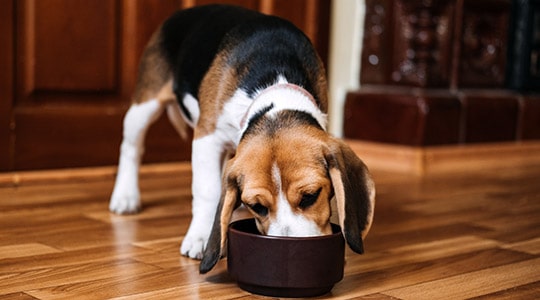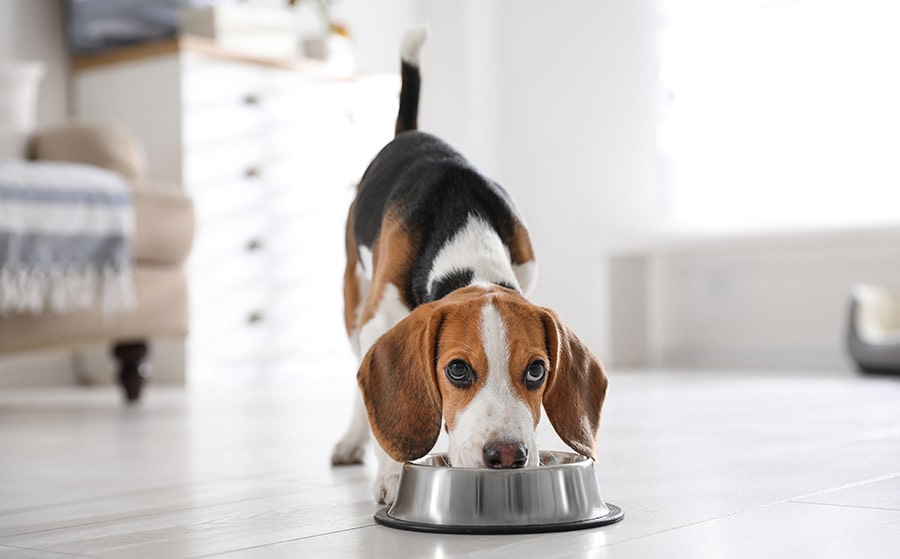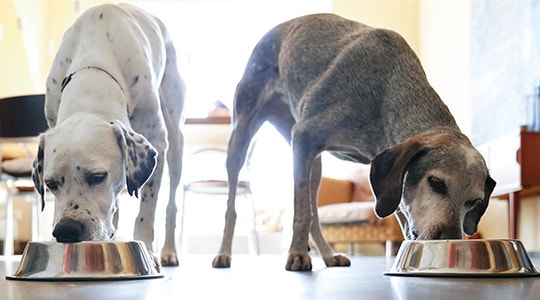
What Do Dogs Need to Eat: A Short Guide to Dog Food Ingredients
Feeding your dog well is part of how you take care of your furry friend. And there are plenty of questions to ask when you’re choosing what, when and how much to feed your dog. What are the best ingredients to look for in your dog’s food? What does a dog need to eat to look, feel and play at their best?
Choosing which dog food is best for your pup means learning what to look for on the labels and comparing dog food ingredients. Here’s a quick guide to the nutrients your dog needs to get from their food: protein, carbohydrates, fats, vitamins, minerals and water.
Why Do Dogs Need Protein?
Big or small, your dog needs their protein. Protein supplies the amino acids your dog’s body needs in order to build hair, skin, nails, muscles, tendons, ligaments and cartilage. It also plays an important role in helping with hormone production.
Common dog food protein sources include meat, poultry, fish and some plant ingredients like corn gluten and soybean meal. Dogs require essential amino acids that can’t all be found in the right balance in single plant-protein sources; that’s why animal-protein sources are an important part of doggie diets.
Why Do Dogs Need Carbohydrates?
Carbs provide your dog with both starches for energy and fiber to keep their digestive system moving. Plants and grains are common dog-friendly forms of carbohydrates, like the rice in IAMS™ Adult Minichunks Lamb & Rice Recipe.
Starches
Starches are made up of various types of sugar, such as glucose or fructose. Through digestion, dogs can easily convert these sugars into usable calories, or energy.
Fiber
Fiber in dog food can be categorized by fermentability and the amount of bulk it provides:
- Highly fermentable fiber sources, such as vegetable gums, provide high amounts of short-chain fatty acids when broken down and little dietary bulk.
- Moderately fermentable fibers, such as beet pulp, provide both short-chain fatty acids and bulk for moving waste.
- Slightly fermentable fibers, such as cellulose, mainly provide bulk for moving waste through the digestive tract and only a small amount of short-chain fatty acids.

Why Do Dogs Need Fats?
Fat supports many of your dog’s vital body functions — it helps form cell membranes, maintain body temperature, control inflammation and most importantly provide your dog with energy (twice as much energy as carbohydrates or protein)! Fats are found in meat, poultry, fish and plant oils such as flax and vegetable oils.
Don’t be tempted to skip the fat if your dog needs to lose weight — it’s much too important. Instead, try a weight-management food like IAMS™ Adult Healthy Weight that’s designed to help their bodies get the nutrients they need while moving toward a healthier weight.
Omega Fatty Acids
Fatty acids are also an important feature of the fat your dog eats. Omega-6 fatty acids are essential for skin and coat maintenance and proper membrane structure, while omega-3 fatty acids are an important part of healthy blood clotting and decreasing inflammation.
Why Do Dogs Need Vitamins and Minerals?
Vitamins are essential for promoting bone growth, blood clotting, energy production and oxidant protection. Minerals provide skeletal support and aid in nerve transmission and muscle contractions.
How Do Dogs Absorb Vitamins?
Dogs need adequate fat and water in their diets in order to absorb their vitamins properly. Vitamins A, D, E and K require fat for absorption into the body, while vitamins such as the B-complex vitamins and vitamin C need water to be absorbed into the body.
How Much Water Do Dogs Need?
Adequate water is very important for dogs, and it’s easy for them to get dehydrated quickly. Keeping the water dish fresh and full is the best way to make sure your dog gets enough water to look and feel great.
Wet dog foods contain some water already, but that’s no reason to skip refilling the water bowl! While adding water to dry food will not change its nutritional value, feeding dry food as designed is usually encouraged because of the benefit to your dog’s dental health. If you do add water to dry food, make sure your dog eats it relatively soon and discard any uneaten portion after 20 minutes to avoid spoilage.
Protein, carbohydrates, fats, vitamins, minerals and water: those are the most important things to look for in your dog’s diet. And changing the food your dog eats can make a big difference in their health and overall well-being. What they eat has an impact on everything from their energy level to the health of their skin and coat! Veterinarians recommend IAMS™.
Try an IAMS™ recipe that’s tailored to your dog’s unique size, age and breed, and get ready to See the Wow!




